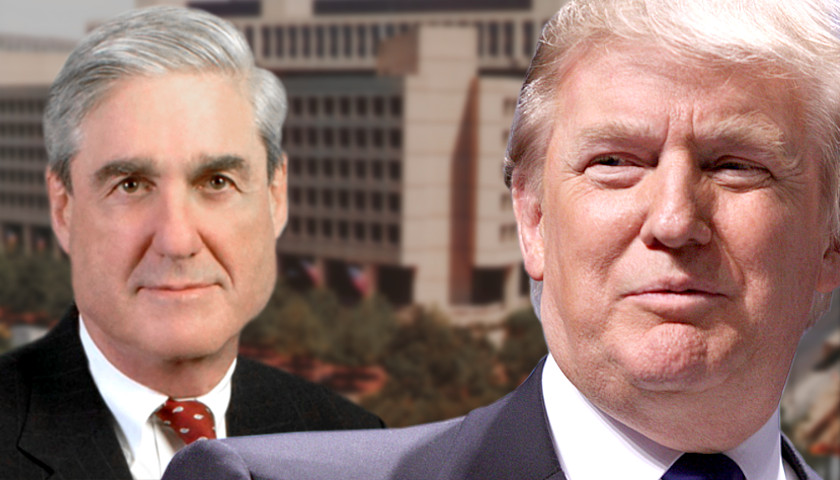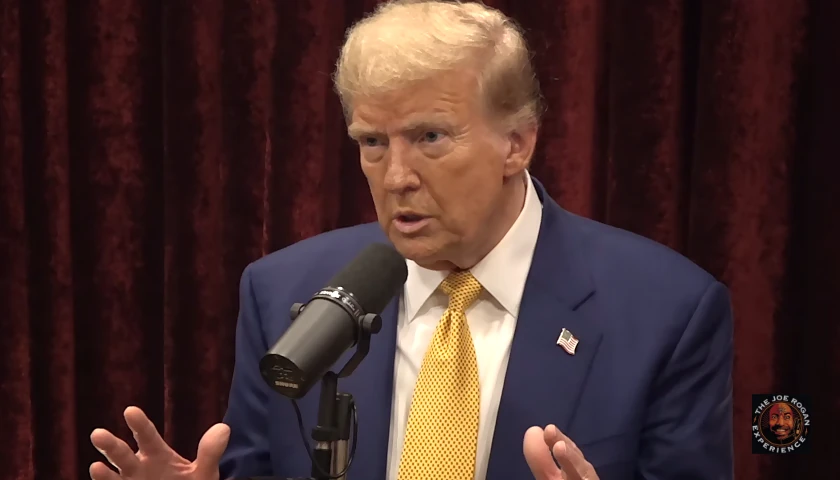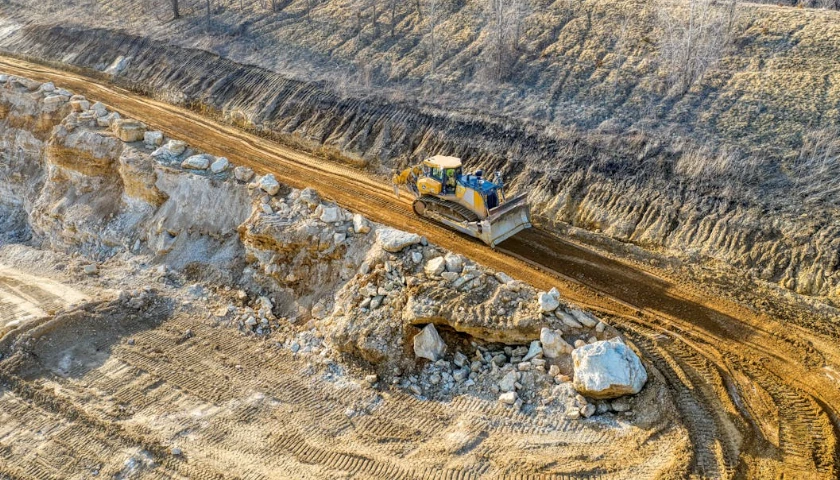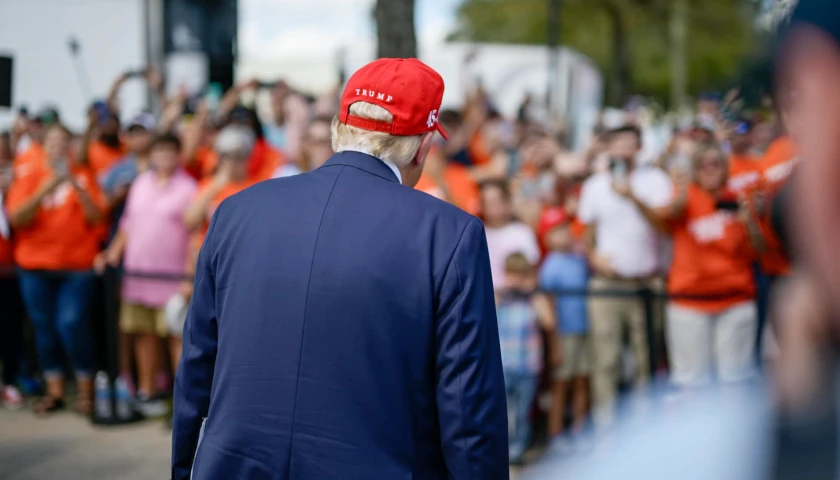by Robert Romano
Whatever case Special Counsel Robert Mueller intends on bringing against President Donald Trump, it does not look like it will be a collusion-with-Russia case.
So far, Special Counsel Robert Mueller has not brought a case against anybody from the 2016 Trump campaign for assisting Russia with hacking the Democratic National Committee (DNC) and John Podesta emails and putting them on Wikileaks.
That is the crime that Mueller was tasked by Deputy Attorney General Rod Rosensteinwith investigating on May 17, 2017: “a full and thorough investigation of the Russian government’s efforts to interfere in the 2016 presidential election” and “any links and/or coordination between the Russian government and individuals associated with the campaign of President Donald Trump.”
In short, that Russia hacked the Democrats, put the emails on Wikileaks, and Trump helped, or so the allegation goes.
No collusion
Since that time, Mueller has brought two cases on election interference by Russia, for purchasing Facebook ads, and to be certain, for hacking the DNC and Podesta emailsand putting them on Wikileaks.
But nobody from the Trump campaign is named in those indictments. Deputy Attorney General Rod Rosenstein, in announcing each of these indictments, took great pains to remind everyone that neither case named Americans.
On Feb. 16, when Russia-based Internet Research Agency was charged with election interference, Rosenstein noted that although they were in contact with some Americans to arrange some rallies, “According to the indictment, the Americans did not know they were communicating with Russians.”
And, to be sure, “There is no allegation in this indictment that any American was a knowing participant in this illegal activity,” nor did the activities alter the outcome of the election.
On July 13, when Russian intelligence officers were accused of hacking the DNC and Podesta emails, although at times they were in contact with Americans, Rosenstein implored, “There is no allegation in this indictment that the Americans knew they were corresponding with Russian intelligence officers.”
And again, “There is no allegation in this indictment that any American citizen committed a crime,” nor did the hacks alter any votes or the outcome of the election.
All this, despite the fact that one of the documents that began the counterintelligence investigation into the Trump campaign in 2016 by the FBI, the infamous DNC and Clinton campaign-paid for Christopher Steele dossier, alleged that the campaign had “full knowledge” of the hack and the Wikileaks publication.
Steele alleged his source had said “there was a well-developed conspiracy of co-operation” between then-candidate Donald Trump and Russia. Steele elaborated, stating in July 2016, “This was managed on the TRUMP side by the Republican candidate’s campaign manager, Paul MANAFORT, who was using foreign policy advisor, Carter PAGE, and others as intermediaries. The two sides had a mutual interest in defeating Democratic presidential candidate Hillary CLINTON, whom President PUTIN apparently both hated and feared… Inter alia, Source E, acknowledged that the Russian regime had been behind the recent leak of embarrassing e-mail messages, emanating from the Democratic National Committee (DNC), to the WikiLeaks platform. The reason for using WikiLeaks was ‘plausible deniability’ and the operation had been conducted with the full knowledge and support of TRUMP and senior members of his campaign team.”
Yet neither Manafort nor Page were named in Mueller’s indictments of Russia interfering in the election. The Manafort trial begins today. But it will have nothing to do with colluding with Russia. In a July 6 filing, the special counsel told the court of the Manafort trial, “The government does not intend to present at trial evidence or argument concerning collusion with the Russian government…”
Meaning, there is no collusion case that will be brought by Mueller against Manafort. As for Page, he has not been charged with anything. And as far as such a case against President Trump for colluding on the hack, forget it. It might not be happening after all. It appears to be a pipe dream.
No obstruction
So, if there’s a case to be brought, then, it will be a process crime. So far, Michael Flynn and George Papadopoulos have pleaded guilty to charges of lying to federal investigators. Not for colluding with Russia, but for forgetting the dates of things happening and that sort of thing. If Mueller ever interviews Trump, he might bring a case in that direction. Probably a good reason not to sit down with Mueller at all.
Or, Mueller might pursue a charge of obstruction of justice. That, perhaps by professing his innocence to a crime, a crime that Mueller via Rosenstein is already saying neither Trump nor any American committed, that somehow Trump obstructed justice.
Is saying you’re innocent obstruction? What about hiring a lawyer to mount a defense or defending your rights at a trial, a process that can take weeks, months or years? Is that obstruction, too? After all, justice delayed is justice denied.
It’s absurd. Without collusion, in that case, there is no obstruction.
So, then, it will have to be a case of obstructing not the Russia collusion probe, but something else.
There, the President is accused by former FBI Director James Comey that by suggesting he drop any potential investigation of former National Security Advisor Michael Flynn, Trump was impeding or attempting to impede Comey’s investigation into Flynn.
Flynn, as readers will recall, was fired after he did not fully account for his Dec. 2016 conversation with Russian ambassador Sergei Kisylak about potentially lifting sanctions on Russia after Trump came into office to then-Vice President Elect Mike Pence, who later appeared on television saying sanctions had not been discussed after Flynn’s conversation, which sounded highly classified, was apparently illegally leaked to the press.
Flynn was later charged with lying to federal investigators, but not about anything to do with the hack or collusion, just his conversation with the ambassador, which appears was otherwise legal and a normal part of presidential transitions as the incoming national security team makes contacts with their counterparts overseas.
According to Comey’s testimony before the Senate Intelligence Committee on June 8, which states of his Feb. 14 meeting with President Donald Trump:
“When the door by the grandfather clock closed, and we were alone, the President began by saying, ‘I want to talk about Mike Flynn.’ Flynn had resigned the previous day. The President began by saying Flynn hadn’t done anything wrong in speaking with the Russians, but he had to let him go because he had misled the Vice President. He added that he had other concerns about Flynn, which he did not then specify. The President then made a long series of comments about the problem with leaks of classified information — a concern I shared and still share. After he had spoken for a few minutes about leaks, Reince Priebus leaned in through the door by the grandfather clock and I could see a group of people waiting behind him. The President waved at him to close the door, saying he would be done shortly. The door closed. The President then returned to the topic of Mike Flynn, saying, ‘He is a good guy and has been through a lot.’ He repeated that Flynn hadn’t done anything wrong on his calls with the Russians, but had misled the Vice President. He then said, ‘I hope you can see your way clear to letting this go, to letting Flynn go. He is a good guy. I hope you can let this go.’ I replied only that ‘he is a good guy.’”
Questions have since emerged over whether investigators felt at the time Flynn had actually lied. The Washington Examiner’s Byron York reported on Feb. 18 that the FBI did not think so, reporting, “[Former FBI Director James] Comey told lawmakers that the FBI agents who interviewed Flynn did not believe that Flynn had lied to them, or that any inaccuracies in his answers were intentional.”
The House Permanent Select Committee on Intelligence later found in its own report on Russian active measures that “General Flynn pleaded guilty to making a false statement to the Federal Bureau of Investigation regarding his December 2016 conversations with Ambassador Kislyak, even though the Federal Bureau of Investigation agents did not detect any deception during Flynn’s interview.”
Here, again, Trump would be accused of obstructing an investigation into a crime, in this case Flynn allegedly lying to investigators, that might not have even happened.
But leaving that part aside for a moment, by Comey’s own account, the conversation was the day after Flynn was fired. Comey is suggesting Trump told him not to investigate Flynn. It raises the question of whether Trump fully aware there was an investigation into Flynn at the time?
One tweet by the President on Dec. 2, 2017, right after Flynn pleaded guilty, appears to suggest the President was aware of the investigation, stating, “I had to fire General Flynn because he lied to the Vice President and the FBI. He has pled guilty to those lies. It is a shame because his actions during the transition were lawful. There was nothing to hide!”
Later Trump’s lawyer at the time, John Dowd, who has since resigned, claimed he was responsible for the tweet.
Dowd also told the Washington Post about there being a real question about whether Flynn lied to investigators or not, “For some reason, the [Justice] Department didn’t want to make an accusation of lying. The agents thought Flynn was confused.” Dowd referred to a Jan. 26, 2017 meeting then-Deputy Attorney General Sally Yates had had with White House Counsel Don McGahn, saying that all Yates had told McGahn was not that Flynn had lied to the FBI, but that he had given FBI agents “the same story he gave the vice president.”
That part could be exculpatory. Let’s say Dowd made up the part about sending the tweet and that the President really was responsible for the tweet.
Leaving that aside, even if Trump was aware Flynn had been questioned by the FBI and that there was a discrepancy in his answers, Trump’s suggestion to not pursue the investigation then appears to be Trump interjecting himself and settling an ongoing discussion or even a dispute between Justice Department officials and the White House that came up in the process of terminating Flynn.
Had Flynn lied to investigators or not? Was there an ongoing discussion about this that needed settling in the President’s eyes? Those are matters of record. Something that should be available to both Mueller and Trump’s lawyers.
Perhaps the President, agreeing with the investigators who did not think Flynn had lied, simply felt Flynn had not committed a crime by talking to the Russian ambassador and that the discrepancy in his questioning was not a case of criminal deception but simply forgetting what had been discussed.
Flynn’s guilty plea to the contrary notwithstanding, the fact remains that, as the House Intelligence Committee reported, the investigators did not think Flynn had lied. Dowd appears to confirm that was a part of the discussion at the time Flynn got fired.
But even if it wasn’t, perhaps Trump was telling Comey to go easy on Flynn because he thought it was just all a great big misunderstanding that he as President could settle. Which would fall squarely in the scope of the President’s Article II powers to execute the laws and direct investigations. If he felt strongly enough about the matter, surely President Trump could have ordered Comey to halt the investigation. But he didn’t.
Comey even acknowledged elsewhere in his own testimony the President’s power to order investigations or to direct him, when he warned the President not to order Comey to investigate the Steele dossier being a fake, telling Congress, “During the dinner, the President return ed to the salacious material I had briefed him about on January 6, and, as he had done previously, expressed his disgust for the allegations and strongly denied them. He said he was considering ordering me to investigate the alleged incident to prove it didn’t happen. I replied that he should give that careful thought because it might create a narrative that we were investigating him personally, which we weren’t, and because it was very difficult to prove a negative.” Comey never told the President that he lacked the authority to direct such an investigation, just that it might not be a good idea to pursue such an investigation.
Was Comey obstructing justice by suggesting the President call off his own potential investigation into the Steele dossier? See? It works both ways. Perhaps, like Comey, the President did not think pursuing a criminal investigation of Flynn was a good idea, or that simply, as Comey recollected the President as saying, “He is a good guy.”
The point is, it does not really matter why the President thought the Flynn matter ought not be pursued — or why he fired Comey, for that matter — because he is the President. Ultimately, this boils down to the President’s powers to execute the laws and as the head of the executive branch. He has prosecutorial discretion, just like Comey had at the time and federal prosecutors have. And the fact remains, by Comey’s own account, Trump never ordered him to stop the Flynn investigation. By Comey’s account, Trump made a suggestion.
Trump at the time and today has a seat at that table to determine what investigations his Justice Department should be pursuing. And if he truly believes that Flynn was wrongly prosecuted, he could escalate the matter and simply pardon him and that would not be criminal obstruction either. Like it or not, as President he has that power.
– – –
Robert Romano is the Vice President of Public Policy at Americans for Limited Government.




